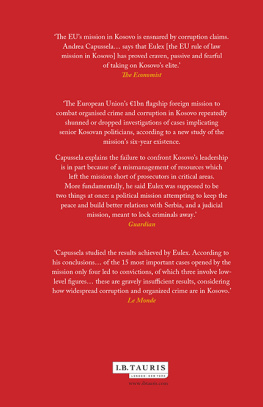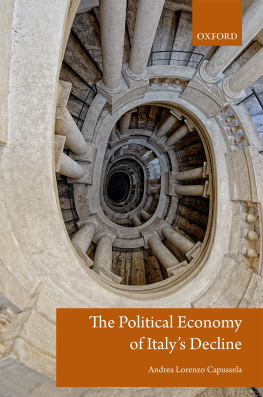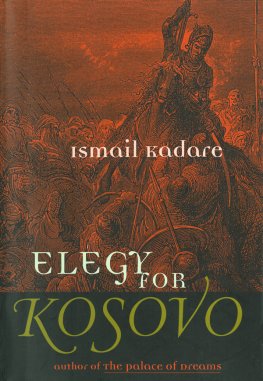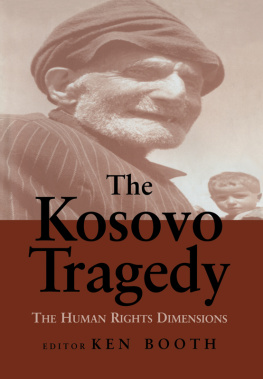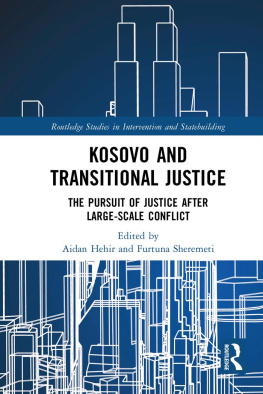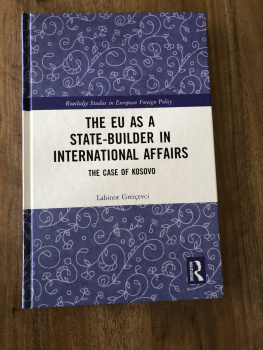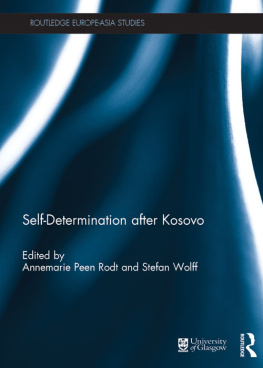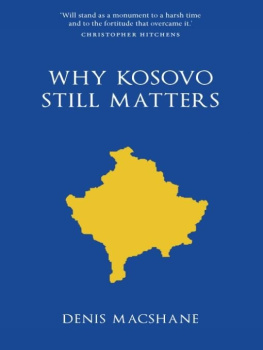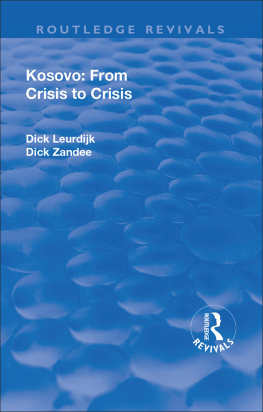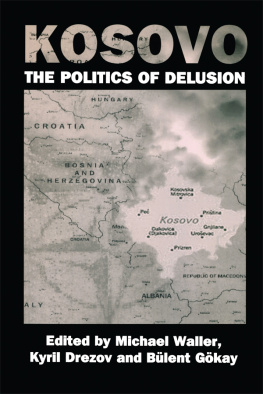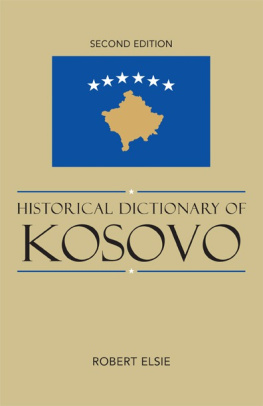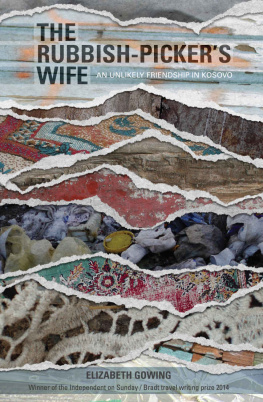
Andrea Lorenzo Capussela has a PhD on the cross-border aspects of competition policy from the University of Milan. He then moved to Kosovo, where until the end of March 2011 he was the head of the economics unit of the International Civilian Office. He has appeared in the Guardian and The Economist as a commentator on the region. He lives in Milan.
STATE-BUILDING
IN KOSOVO
Democracy, Corruption and
the EU in the Balkans
A NDREA L ORENZO C APUSSELA

New hardback edition published in 2015 by
I.B.Tauris & Co Ltd
London New York
www.ibtauris.com
Copyright 2015 Andrea Lorenzo Capussela
The right of Andrea Lorenzo Capussela to be identified as the author of this work has been asserted by the author in accordance with the Copyright, Designs and Patents Act 1988.
All rights reserved. Except for brief quotations in a review, this book, or any part thereof, may not be reproduced, stored in or introduced into a retrieval system, or transmitted, in any form or by any means, electronic, mechanical, photocopying, recording or otherwise, without the prior written permission of the publisher.
Every attempt has been made to gain permission for the use of the images in this book. Any omissions will be rectified in future editions.
References to websites were correct at the time of writing.
ISBN: 978 1 78076 915 8
eISBN: 978 0 85773 888 2
A full CIP record for this book is available from the British Library
A full CIP record is available from the Library of Congress
Library of Congress Catalog Card Number: available
Meanwhile my novels opening section
is finished, and Ive looked it through
meticulously; in my fiction
theres far too much of contradiction,
but I refuse to chop or change.
(Pushkin)
CONTENTS
LIST OF FIGURES AND TABLES
Figures
Governance in Kosovo and the Balkans, 20008. Source: World Bank.
Control of corruption in Kosovo and the Balkans, 200413. This indicator reflects perceptions of the extent to which public power is exercised for private gain, including both petty and grand forms of corruption, as well as capture of the state by elites and private interests. Source: World Bank.
The rule of law in Kosovo and the Balkans, 200413. This indicator reflects perceptions of the extent to which agents have confidence in and abide by the rules of society, and in particular the quality of contract enforcement, property rights, the police, and the courts, as well as the likelihood of crime and violence. Source: World Bank.
Voice and accountability in Kosovo and the Balkans, 200413. This indicator reflects perceptions of the extent to which a countrys citizens are able to participate in selecting their government, as well as freedom of expression, freedom of association, and a free media. Source: World Bank.
Correlation between governance and aid (1). Source: World Bank.
Correlation between governance and aid (2). Source: World Bank.
Correlation between aid and life expectancy. Source: World Bank.
Correlation between life expectancy and governance (1). Source: World Bank.
Correlation between life expectancy and governance (2). Source: World Bank.
Tables
Selected indicators, 20057. Source: IMF, World Bank, EBRD.
Eulexs main cases, 200814. Source: Eulexs judgements and press releases, official reports, authors analysis.
June 2014 elections: results. Source: Kosovo Central Election Commission.
June 2014 elections: scenarios. Source: Kosovo Central Election Commission, authors elaboration.
Selected indicators, 200817. Source: IMF (December 2013), EBRD, World Bank, International Labour Organization.
Kosovo, Serbia, Albania and Tunisia: selected indicators. Source: World Bank, International Labour Organization, Freedom House.
EU aid, selected data. Source: EU, authors elaboration.
ABBREVIATIONS
| AAK | Aleanca pr Ardhmrin e Kosovs (Alliance for the Future of Kosovo) |
| AKR | Aleanca Kosova e Re (New Kosovo Alliance) |
| CFSP | Common Foreign and Security Policy |
| CSDP | Common Security and Defence Policy |
| EBRD | European Bank for Reconstruction and Development |
| EEAS | European External Action Service |
| EU | European Union |
| EUSR | European Union Special Representative |
| GDP | gross domestic product |
| KFOR | NATO Kosovo Force |
| KLA | Kosovo Liberation Army |
| KPC | Kosovo Protection Corps |
| KSF | Kosovo Security Force |
| LDK | Lidhja Demokratike e Kosovs (Democratic League of Kosovo) |
| ICG | International Crisis Group |
| ICJ | International Court of Justice |
| ICO | International Civilian Office |
| ICR | International Civilian Representative |
| ICTY | International Criminal Tribunal for the former Yugoslavia |
| IFC | International Finance Corporation |
| IMF | International Monetary Fund |
| ISG | International Steering Group |
| NATO | North Atlantic Treaty Organisation |
| NGO | non-governmental organization |
| OECD | Organisation for Economic Cooperation and Development |
| OSCE | Organisation for the Security and Cooperation in Europe |
| PDK | Partia Demokratike e Kosovs (Democratic Party of Kosovo) |
| PISG | Provisional Institutions of Self-Government |
| SHIK | Shrbimi Informativi Kosovs (Kosovo Information Service) |
| SITF | EU Special Investigative Task Force |
| SLS | Samostalna Liberalna Stranka (Independent Liberal Party) |
| SRSG | Special Representative of the Secretary-General of the United Nations |
| UN | United Nations |
| UNMIK | United Nations Interim Administration Mission in Kosovo |
| WTO | World Trade Organization |
PREFACE
Impunitas semper ad deteriora invitat.
[Impunity invites ever worse deeds]
La critica ais facila, il fer dificil.
[Criticism is easy, action difficult]
Why has the West created a fragile state in the heart of Europes least stable region? This question has not yet been addressed in depth, either by the literature on the Balkans or by studies in state-building. It seemed an interesting question, though, because nowhere else have such vast resources been invested in erecting a state as they have in Kosovo. And it is a relevant one, because the peace and security of that region remains precarious and Kosovo continues to host criminal groups that trade in narcotics, weapons, cigarettes, migrants and prostitutes, most of which end up in the squares of the European Union.
Kosovo is a small corner of the former Yugoslavia, of negligible economic or strategic interest. But it has played a surprisingly important role in the recent history of Europe and in the evolution of international relations, on which its vicissitudes have had deeper and more lasting influence than have the much bloodier wars in Bosnia and Croatia. Indeed, the conclusions of this book concern less Kosovo than the practice of state-building and the European common foreign policy.
Next page
